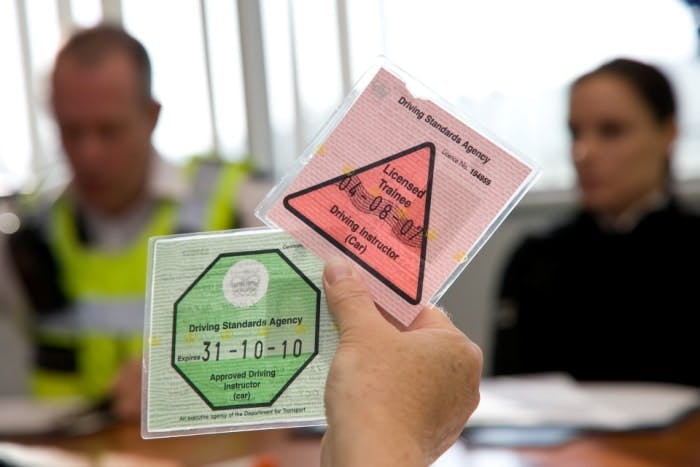
You may have noticed that the world of driving is full of abbreviations: DVSA, DVLA, ADI, MSM—the list goes on! Just when you think you've cracked it, another car-related code comes along to fox you. Even us industry insiders can get confused!
You would be forgiven for feeling a bit stumped, therefore, when driving schools give you the option to take lessons with a PDI. What exactly is a PDI? And on top of that, are you safe learning with one?
Luckily for you, we're about to answer all of this and more!
What is a PDI?
A PDI is a potential driving instructor. Now, this is not just any Tom, Dick or Sally harbouring ADI aspirations. To be referred to as a PDI you must have applied (and been accepted) to begin training to be an ADI. For the purpose of this article, we're interested in PDIs at a very specific stage of the qualification process.
PDIs with power

When a PDI has passed 2 out of the 3 tests required to qualify as an ADI, and completed at least 40 hours of training with a DVSA-approved instructor, they have the option of applying for a trainee licence. Once obtained, this gives them the ability to charge learners for driving lessons.
They can only do this through an established driving school, and they must declare their PDI status by displaying the trainee licence (a rather fetching pink triangle) on their vehicle. During this time, they have 3 attempts to pass part 3 of the ADI qualification tests, before it's back to square one.
Basic precautions

If you are considering taking lessons with a PDI, there are a few basic precautions you should definitely take before handing over your cash. Of course, the fact that PDIs must be associated with a driving school means that you do at least have the comfort of knowing a higher force can get involved should anything go wrong.
For starters, make sure the person offering you tuition is actually a PDI with a trainee licence. You'd be surprised how many people have been duped by fake instructors working on an illegal basis! Look for their pink badge or, if you can't see it on the vehicle, ask them to produce it before even getting behind the wheel.
Once you know you're with a licenced PDI, try to find out how long the instructor has had their badge privileges. It's obviously better for you if a PDI has managed to build up some experience teaching learners before they take you on. Not many people fancy being in the position of guinea pig! Then again, they do have to start somewhere…
What's your driving status?
How well you're likely to progress with the help of a PDI is also down to where you're up to in your driving journey. What kind of learner are you? If you're a complete beginner, for example, learning from someone who is still in training is unlikely to give you the best start. In contrast, if you're an experienced driver who's just a little rusty, a few hours with a PDI could be all you need.
For some PDIs, their licence comes with the condition that 20% of their lessons must be supervised. If you suffer from nerves behind the wheel, having an extra pair of eyes in the car is unlikely to make you feel any better! Anyone who would feel pressured in this scenario should stick with a tried and trusted ADI.
Don't get us wrong: licenced PDIs may know the ropes and be great drivers, but it's their teaching ability that isn't fully honed yet. If you're the type of learner who picks up new skills easily, this might be OK. You could maybe start with a PDI, have a refresher course with a PDI, or supplement your other lessons with a PDI.
If you do go for the latter option, just make sure their teaching doesn't interfere with the groundwork your regular ADI has established. A clash of teaching styles could leave you more confused than you were as a complete beginner!
Swings and roundabouts
As with any situation that's not completely clear cut, the best way to decide what to do is to weigh up the pros and cons. In the case of PDIs, there are three main factors that we think are worth considering.
Money

The most enticing aspect of learning to drive with a PDI is the accompanying price tag. You'll often find that driving schools offer discounted lessons with these instructors for the obvious reason that they are not fully qualified. So, if you're pinching the pennies, it might be worth taking a chance on a trainee.
It's also worth remembering that, while often advertised as cheaper than regular lessons, learning with a PDI won't necessarily save you money. There are technically no set rules on how much someone with a trainee licence can charge for lessons.
Time
A major concern when learning to drive is how long the whole process is going to take. For those who want to get passed as soon as possible, taking a leap of faith with a PDI is probably not worth the risk. Conducting intensive courses, for example, not only requires the ability to teach people the relevant skills, but involves doing so in the most efficient way possible. This level of teaching ability requires quite a bit of experience.
Then again, even if you're happy to take the slow and steady approach to driving, working with a PDI carries other risks. Their trainee licence is only valid for 6 months. This could result in your course being quite rushed or, if you're very unfortunate, may leave you stranded without an instructor. That's exactly what happened to a learner from Kent, who paid a hefty sum to take lessons with a PDI. Part way through her course, her instructor failed part 3 of the test for the third time and had his licence and car revoked—leaving her requiring a whole new instructor just weeks before her test date. Not ideal!
Safety

Any PDI who has managed to obtain a trainee licence will have had criminal record and background checks, so you can rest easy on that front. What's more, the DVSA obviously thinks it's safe for you to learn with a PDI, otherwise it wouldn't be possible in the first place. The bigger threat is posed by individuals pretending to be licenced PDIs, so just ensure that you see official documentation before agreeing to lessons.
Are you safe learning with a PDI?
Of course, everyone needs to start somewhere and the trainee licence is a great way for PDIs to get some practice in with real pupils. Plus, you may appreciate the enthusiasm someone in the early stages of their career brings to the job!
If you're an eager learner who wants to get out on the road as soon as possible, however, it's definitely worth investing in a fully qualified professional. You just can't beat experience.
Subscribe for driving advice, offers & more
We'd love to let you know about our courses, news and offers via email. You may unsubscribe at any time.
Star Genie Limited trading as PassMeFast. Company number 10093359
Copyright © 2024 owned by Star Genie Limited
PassMeFast, Blue Tower, MediaCityUK, Salford, M50 2ST

